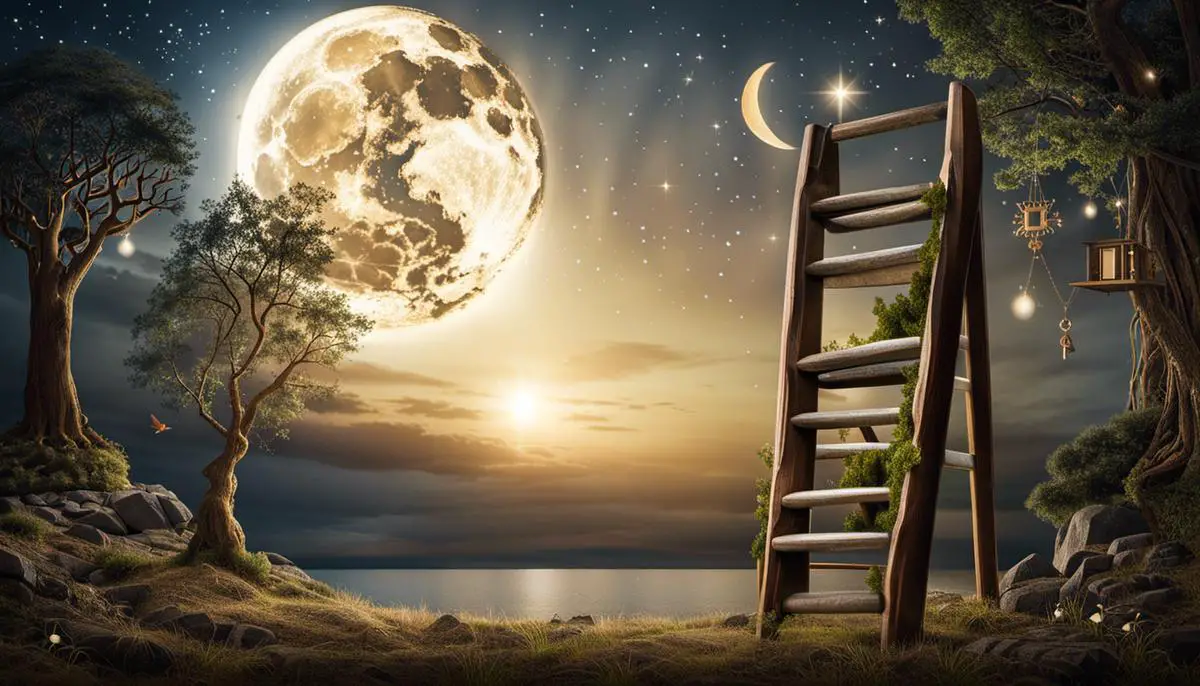In the intriguing world of dreams, every symbol carries potent significance. Experts and scholars ranging from psychologists and anthropologists to philosophers and spiritualists have grappled with the interpretation of dreams, concurring on one point: dreams are a rich language of the subconscious, communicating through potent, multifaceted symbols. Of all the symbols, one of the most profound is death. For some, death in dreams can bring fear and anxiety, but could these troubling dreams be signaling an impending major life change? That’s the question we seek to address, as we journey through the labyrinth of symbology in dreams, zooming in on the symbol of death, and attempt to understand whether dreams of death signify a major life change.
Understanding Dream Symbols
Understanding Dream Symbols: A Deep Dive
Dreams have fascinated mankind for centuries, and their role in our emotional, psychological, and spiritual lives is well-established. In dreams, our unconscious mind communicates in a symbolic language, using images and scenarios that convey deeper meanings.
Psychologists, particularly those in the field of psychoanalysis, have long referred to dreams as the “royal road to the unconscious.” Sigmund Freud and Carl Jung identified dreams as valuable tools for accessing our subconscious thoughts, emotions, and desires, which are often symbolically represented.
The signs and symbols that appear in our dreams can be drawn from our own individual experiences, the collective unconscious, or cultural folklore and tradition. Ranging from animals and people to objects and situations, these symbols often carry complex, multifaceted meanings. For instance, water in a dream could represent emotions, the subconscious, or aspects of purification and cleansing, depending on the individual’s personal and cultural context.
Interpreting Death in Dreams
Considered a universal symbol, death is an integral part of life, and like other symbols, its interpretation can widely vary depending on cultural and personal reference points. Generally speaking, death in dreams does not usually signify an actual physical death.
In psychological terms, dreaming of death often symbolizes the end of something, perhaps a phase, a habit, a relationship, or a way of thinking. This could lead to a transformational process, resulting in the start of a new phase of life or significant changes. Therefore, if you dream of death, it may suggest a potential major life change, or that you are traversing a transitional phase in your life.
Dreaming of death can also denote feelings of fear, anxiety, or suppression, or a desire to escape from certain situations or emotions. It may signify a deep desire for personal changes, marking a need to let go to move forward.
Understanding Death Dreams and Possible Life Changes
Dreaming about death is not an assured indicator of imminent significant life changes, but it can encourage self-examination and trigger shifts in viewpoint. Such dreams can also illuminate underlying fears or unease about change.
Various cultures interpret dreams about death as a sign of rebirth or transformation. In these contexts, it signifies the end of one period in life and heralds the start of a new one, signaling an important transition in the dreamer’s existence.
It’s important to remember that dream interpretation needs an open mind and should not treat symbols too literally. Meanings can greatly differ based on the dreamer’s personal history, emotional state, and cultural upbringing. As such, thoughtful reflection on your dreams and their symbology can aid in self-understanding and preparing for any impending life changes.

Death as a Symbol in Dreams
The Symbolism of Death in Dreams
Death dreams may be unnerving, yet it is vital to recognize that dreams are a multifaceted weaving of memories, feelings, and interpretations of everyday life activities. Dreams often reflect our deepest fears, anxieties, or anticipation of what is to come. As such, the notion of death in dreams carries a wealth of potential interpretations.
The Psychological Interpretation of Death Dreams
Many experts interpret dreaming of death as a sign of major life change or transition. According to Carl Jung, a Swiss psychiatrist and psychoanalyst who founded analytical psychology, dreaming of death could be suggestive of the desire to terminate something in life – a relationship, a job situation, a destructive habit or thinking pattern.
Dreams of death don’t necessarily mean a physical death, rather they could signify an end or a drastic change. In this context, the death in your dream is serving as a metaphor. Death is symbolic of the ending of a significant phase or aspect of your life that may bring about the start of something far more valuable and important.
Diverting Interpretations of Death Dreams
In some interpretations, dreaming of death may also imply a deep desire for escapism. People subconsciously yearning a break from their daily routines or stressors may find themselves seeing dreams involving death. It might call for consideration if you’re under a lot of stress or anxiety and this could be your mind’s way of telling you that you need to take a break and relax.
On the other hand, dreaming about your own death could mean you’re going through a phase of self-transformation. The “old you” may be dying, making way for the “new you” to come into existence. The dream might be signalling you to shed past habits, patterns, or people, and emerge into a new phase of life.
Recurring Death Dreams and Their Significance
Recurring dreams about death may indeed signify a major life change. They are particularly important to pay attention to, as these dreams might be your psyche’s way of demanding your attention to an unresolved issue in your life, or a transition that may be challenging but necessary.
Understanding Death in Dreams
Understanding the representation of death in dreams closely depends on the context in which it appears. Factors such as the features involved in the dream, the feelings encountered throughout, along with your personal perceptions on the concept of death, all contribute to its interpretation.
In essence, while dreaming of death might indicate a significant transformation or shift in one’s life, it cannot be generalized for all due to the fluid nature of dream interpretations. These interpretations tend to fluctuate based on each individual’s current emotional state, personal experiences, and life situations.

Dreaming of Death and Major Life Changes
Dream of Death: Interpretations from Psychological and Traditional Viewpoints
Psychological interpretations commonly view dreams as manifestations of a person’s subconscious mind. This dream realm serves as a platform for the mind to confront and process complex emotions, desires, and fears – something we might struggle with in our waking state. One such potent theme that often surfaces in dreams is death. Although it can be unsettling, dream analysts and psychologists suggest that dreams about death rarely point to a literal end of life. Instead, it often symbolizes a substantial shift or change in one’s existence.
Aligned with traditional interpretations of dreams, death is seen as denoting the conclusion of a phase and the commencement of another. This could represent significant alterations in one’s life such as relocating to a new place, stepping into a new career path, embarking on a fresh relationship, or even experiencing a transformation in personal mindset or self-view.
Sigmund Freud and Carl Jung: Pioneers of Dream Interpretation
Sigmund Freud, a renowned psychologist, held the belief that dreams offer insight into the hidden desires and anxieties of the dreamer. In this context, a death dream may indicate suppressed fears or unresolved issues about change and endings.
On the other hand, Carl Jung, another influential figure in the field of psychology, studied archetypes and the collective unconscious. He indicated that dreams are universal symbols that mirror the inner state of human beings. To Jung, dreaming about death could symbolize an individual’s desire for transformation or self-growth.
Does Dreaming of Death Always Signify a Major Life Change?
Despite the theories and interpretations, it’s essential to remember that not every dream of death signifies a major life change. Dream meanings can vary greatly depending on the dreamer’s personal experiences, emotions, and current life situation.
For instance, if you’re experiencing stress over a pending decision or change, you may have death-themed dreams. The death signifies an end, which may be the way your mind illustrates an end to your indecision or worry once you’ve made the change.
However, if you recently lost someone close to you, dreams about death may simply be part of the grieving process, a way of working through the loss and pain.
Exploring the Meaning of Dreams
Death-themed dreams, while they can be unsettling, sometimes offer critical opportunities for introspection. They provide a mirror for your feelings, thoughts, and apprehensions concerning change and conclusions. Shedding light on the meaning of these dreams can act as a guide during pivotal life transitions and can even offer a blueprint for future upheavals.
In essence, although it’s not definitive, dreams about death might indeed indicate an impending substantial shift in life. Such dreams can represent the symbolic death of a particular life chapter and the inception of a new one. However, it’s crucial to understand that individual circumstances and personal interpretations heavily influence the precise meaning and significance of such dreams.

Case Studies and Real-life Examples
Case Study 1: Professional Shakeup
A relevant example could be an executive who found herself repeatedly dreaming about death. She was neither ageing nor unwell, but her nightmares were consistently centered around death and mortality. Upon consultation with a psychologist, it was determined that these were not necessarily prophetic dreams, but rather expressions of subconscious apprehensions. The executive was in the throes of a significant professional shift, fueled by her decision to quit her job and start her own enterprise. In her case, her dreams of death were perhaps representative of the termination of her former professional life and the dawn of a new vocation.
Case Study 2: End of a Relationship
In a different case, a man in his late twenties began having death-related dreams as his long-term relationship deteriorated. His dreams frequently involved one of them dying, or both, which understandably alarmed him. After several counseling sessions, however, he discovered his dreams weren’t about a literal death. Instead, they were reflecting his inner recognition that his relationship was essentially ‘dead’ and required a significant change. After the couple broke up amicably, his dreams of death ceased, indicating that the major life change had occurred.
Real-Life Example: Overcoming Addiction
An individual suffering from addiction also shares a similar experience with dreams of death. She experienced a repeated dream where she was witnessing her own funeral. As she started dealing with her addiction and getting sober, her dreams shifted from funerals to rebirths, symbolizing her fears about the end of her ‘old life’ and the anxiety around forming a new, sober identity. In this case, her dreams of death were a symbolic herald of a significant life change that was critical for her survival.
Case Study 3: Personal Transformation
A famous example comes from Carl Jung himself, the Swiss psychiatrist and psychoanalyst who founded analytical psychology. Jung dreamed of the underground ‘land of the dead’ several times leading up to his own transformative period, a tumultuous time marked by deep self-reflection after his split with Freud. His dreams of death predated a significant upheaval and period of growth in his own life, symbolizing an ‘inner death’ of old ideas and the birth of new ones.
Considering a myriad of case study analyses and real-life examples, we infer that dreams about death could possibly indicate a significant life alteration. It’s vital, however, to clarify that these dreams do not predict a physical passing, rather they are symbolic of psychological or metaphorical endings and beginnings. The process of interpreting these dream symbols becomes much more insightful when one takes into account the specific psychological state and life circumstances of the one who is dreaming.

How to Deal with Dreams about Death
Comprehending Death-Themed Dreams
Death-themed dreams, while not uncommon, can be rather unsettling. Yet, despite the discomfort they provoke, they rarely symbolize the physical concept of death. Specialists in dream interpretation often propose that such dreams can be symbolic of endings, transformations, or significant life alterations. In essence, contrary to predicting a person’s physical demise, these dreams may forebode the end of an era, such as a career, relationship, habit, or unnecessary parts of oneself.
Types of Death Dreams and Their Possible Interpretations
There are varying types of dreams involving death, each with its unique interpretation. For instance, dreaming of your death could signify a desire for a fresh start or drastic changes in your life. If you dream of a loved one’s death, it might symbolize an aspect of your personal relationship with that individual that is changing or fading. Seeing strangers die might indicate feelings of detachment or loneliness.
Dreams and Fear of Death
Dreams about death may also be an expression of your subconscious fears and anxieties about mortality. Death is a common fear and thus, a popular theme in dreams. It is possible that these dreams are a way of our subconscious mind dealing with that fear.
Handling disturbing dreams
- Positive Affirmative Thoughts: Before sleep, engage in positive thoughts or relaxation techniques.
- Share Your Dreams: Discuss your dreams with a close friend, relative, or mental health professional to help release some of the associated anxiety.
- Professional Consultation: If the dreams persist and cause severe distress, it may be helpful to consult a professional psychiatrist or psychotherapist. They can provide you with tools to manage the distress and potentially help you interpret the dreams in a beneficial context.
Seeking Professional Help
Dreams about death often reflect subconscious fears and anxieties, and they may surface more often during times of stress and change. If you find these dreams are causing significant emotional distress or interfering with your daily life, it may be a good idea to seek professional help. A mental health professional can help you manage your reactions to these dreams and may offer insights into their meanings.
Dream interpretation is a complex process and can vary significantly based on the individual. Remember, it’s always okay to seek help when trying to understand or cope with distressing dreams. After all, mental health is as important as physical health.

Whether it’s a whispered message from the subconscious or a sign of what’s to come, engaging with our dreams and their impacts on our waking lives is an enlightening, potentially transformative journey. Understanding the intricacies of dream symbolism, notably the death symbol in dreams, is a step towards better understanding oneself and identifying impending significant changes. Dreams about death, while unsettling, need not be feared. They can serve as a catalyst for reflection, introspection, and even prepare us for significant shifts in our life. Know when to seek professional help if these dreams become burdensome or induce anxiety, but also consider them as metaphoric messengers nudging you towards an imminent major evolution in your life.
